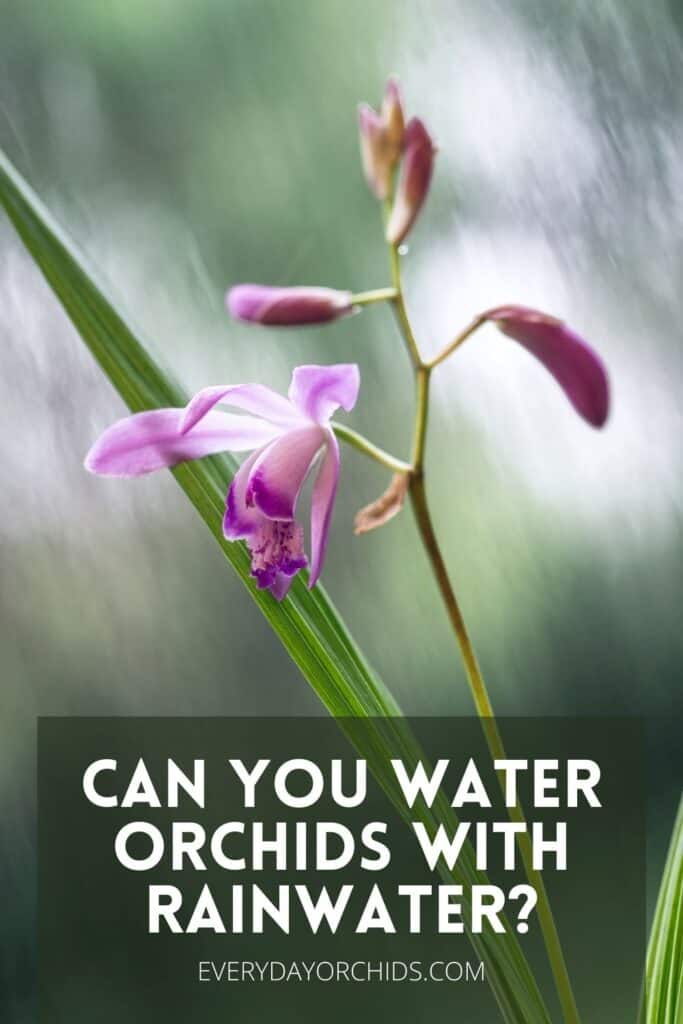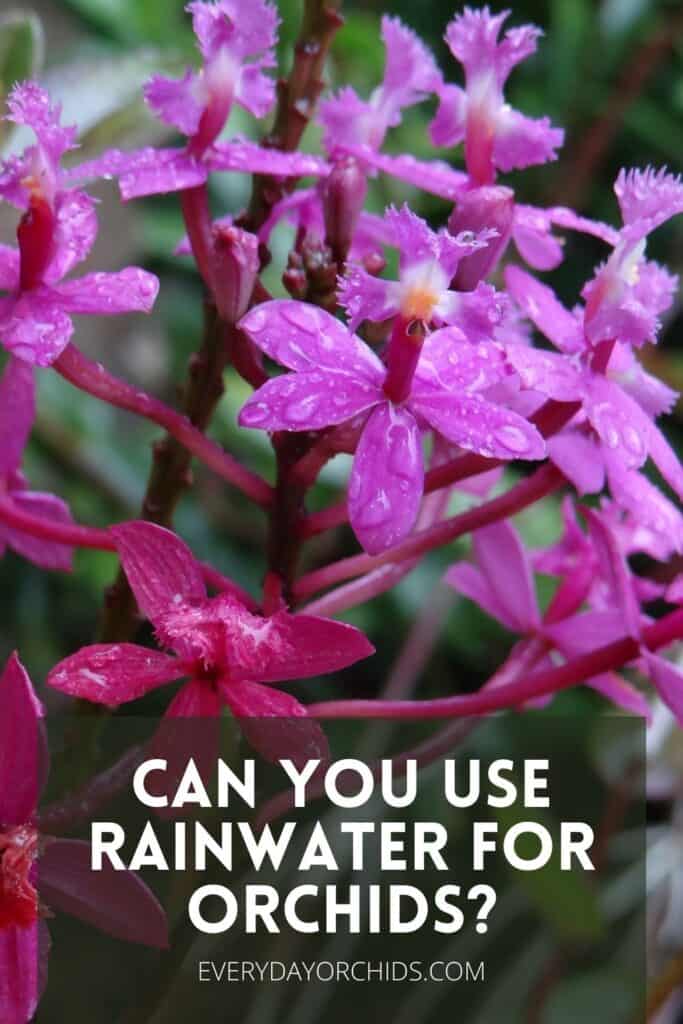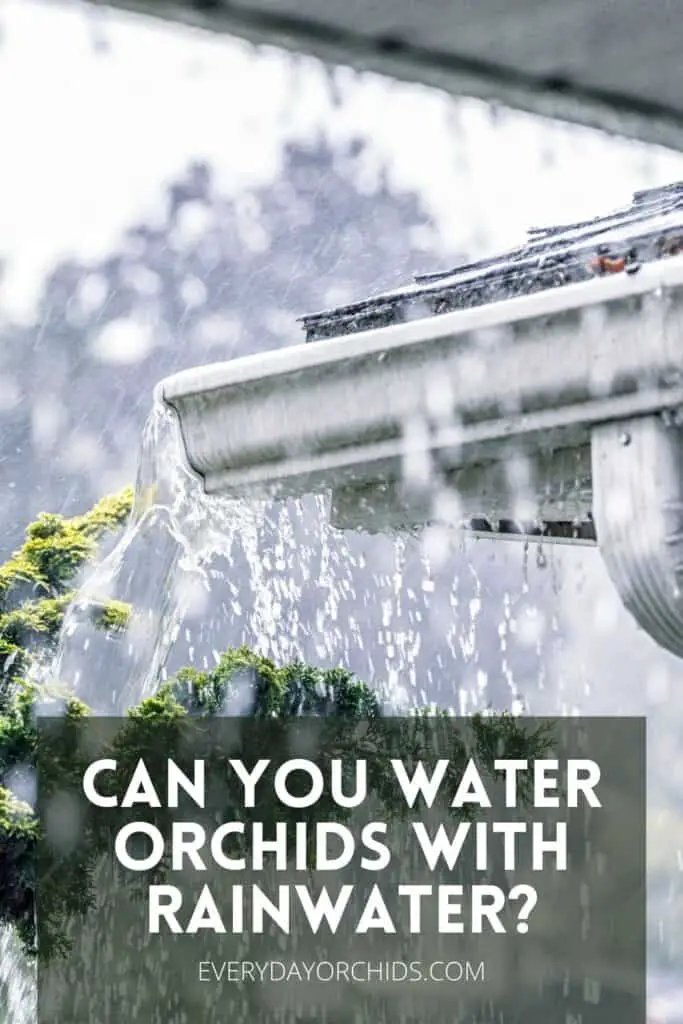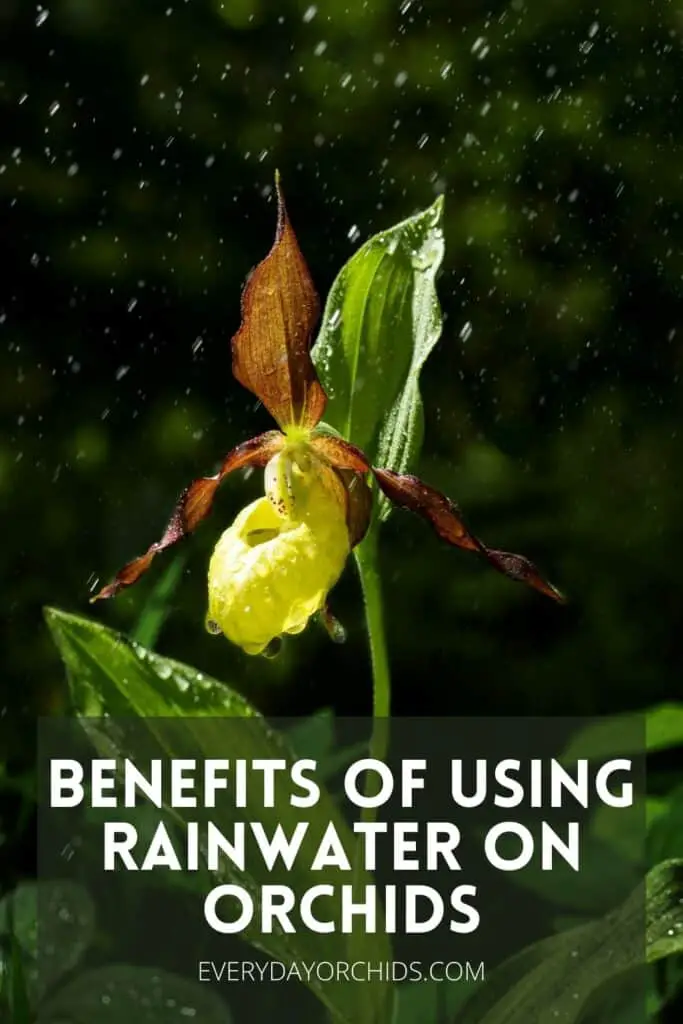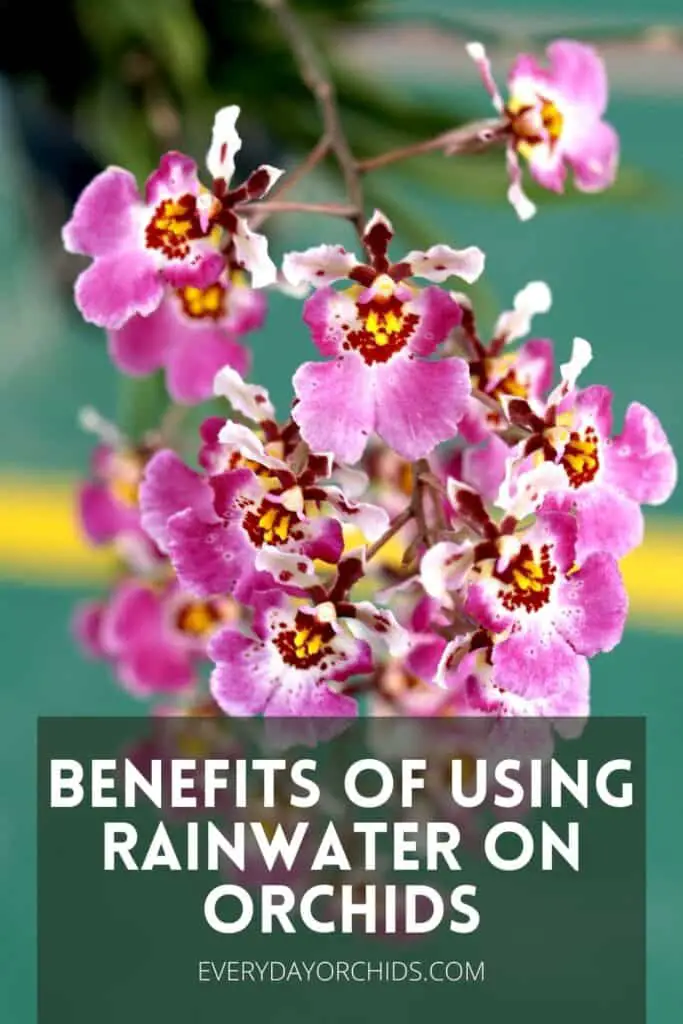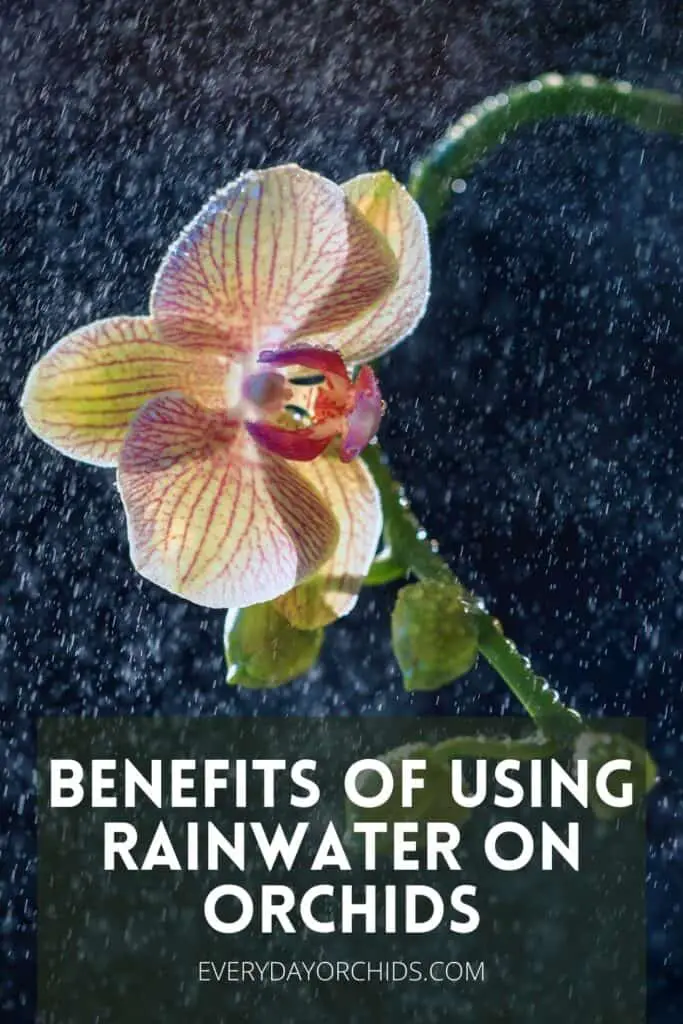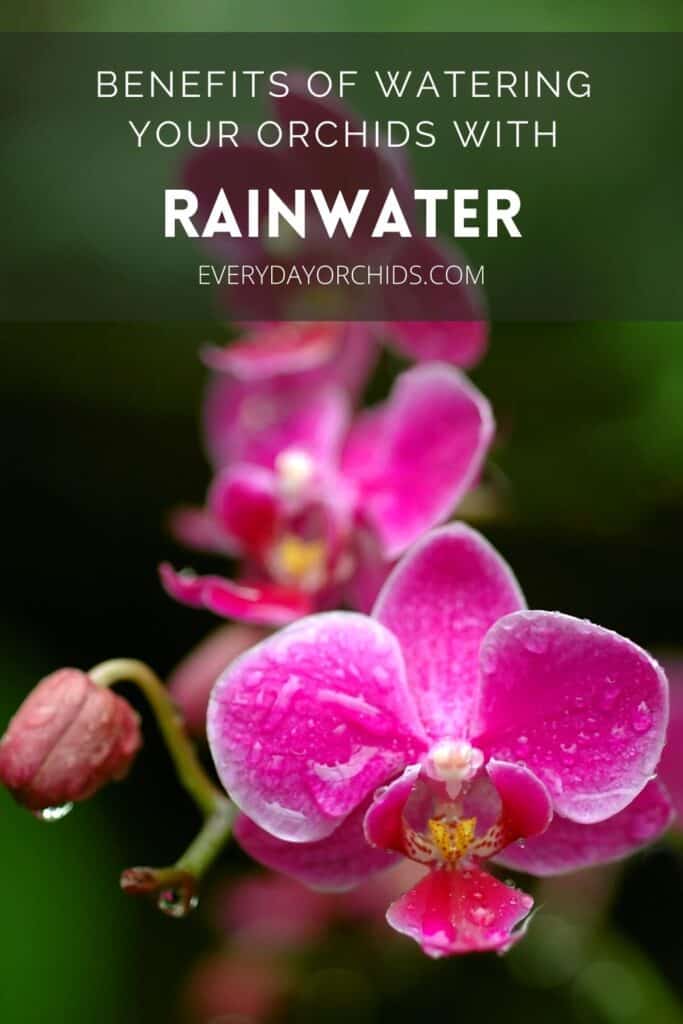You may have heard of orchid growers using rainwater on their orchids, but should you do it too? If you are new to orchid growing, it can be a little confusing figuring out what kind of water is best for your orchids. After all, there are so many options.
There’s rainwater, tap water, filtered water, water that has gone through reverse osmosis, and so on. If you want to get down into the nuanced details, there’s even pH, chemical balance and types of minerals to consider when watering your orchids.
Rainwater has long been considered to be the best type of water for orchids. Rainwater that is clean and largely free of sediment and debris can be safely used to water your orchids. After all, orchids in the wild survive on rainwater without problems.
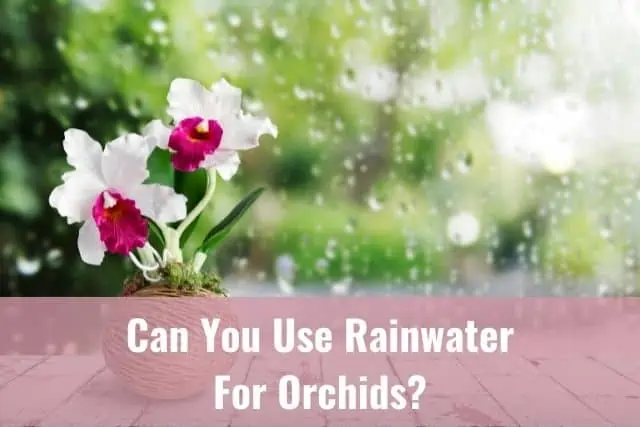
In this article, I’ll go a little deeper into the topic of using rainwater on orchids, the pros and cons of doing so, and things to consider before watering your orchids with rainwater. I’ll also go over how to collect and store rainwater. Keep reading to learn more.
Please note that these links are affiliate links and as an Amazon Associate, I earn from qualifying purchases. Purchases made through affiliate links in this post may generate commissions at no additional cost to you. Use this link for a discounted Amazon Prime trial. Thank you for your support!
Table of Contents
Using Rainwater For Orchids
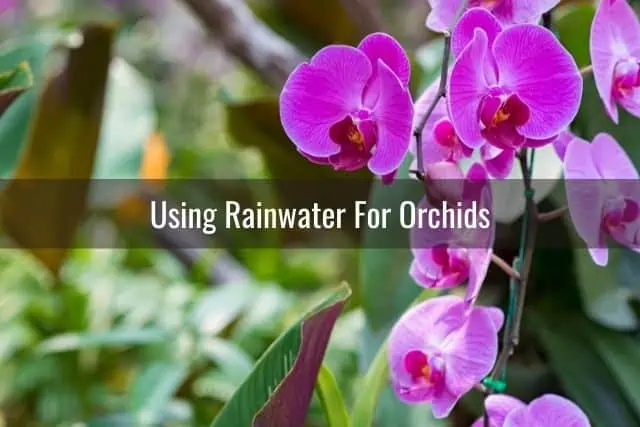
Orchids are tropical plants and using rainwater for your orchids is beneficial in a number of ways. In their natural habitat, rainwater, along with the humidity in the air, are important sources of moisture for these plants.
When opting to use rainwater on your orchids, here are some tips and things to consider.
Use Fresh Rainwater For Orchids
Fresh rainwater is best, as it will likely contain some nitrogen. Nitrogen is used by orchids for growth of leaves and roots. As time goes on, collected rainwater will lose some or most of the nitrogen in the water.
Fresh rainwater also has the benefit of being, well, fresh. The water hasn’t been sitting long, and thus, bacteria and other pathogens haven’t had the chance to multiply in the water.
Filter The Rainwater If Needed
If you find that there is a lot of debris and sediment in the rainwater, you may want to filter it before use. Of course, if the water looks murky, dirty or has a foul odor, you should not use it. Instead, throw it away. It is considered to be contaminated water and will not be good for your orchids.
Add Orchid Fertilizer To The Rainwater
Before using rainwater for your orchids, be sure to add orchid fertilizer to the water first. As mentioned earlier, rainwater on its own contains very little minerals and nutrients.
You will need to supplement the rainwater with orchid fertilizer to ensure that your orchids receive the necessary nutrients to grow.
If you would like to learn more about how to fertilize your orchids, check out my orchid fertilizer guide on Everyday Orchids. There, I go over the basics of how to fertilize your orchids, as well as top orchid fertilizers and how to choose the right one.
Use Urea-Free Orchid Fertilizer
When feeding your orchids, avoid using orchid fertilizer containing urea. This is because the urea in the orchid fertilizer will tend to lower the pH and make the water too acidic.
Instead, look for orchid fertilizer that is urea-free. I recommend this one by Better Gro, which also has higher levels of nitrogen for promoting growth.
As mentioned above, it is generally safe to use rainwater on your orchids. However, there are a few pros and cons you should consider before you start. Let’s dive in to the benefits of rainwater first.
Pros of Watering Orchids With Rainwater
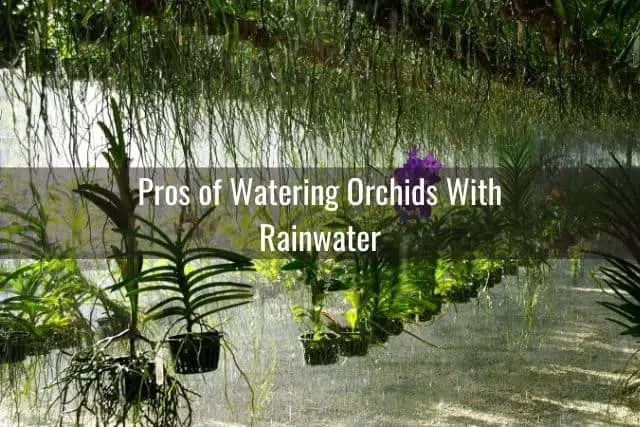
For years, serious orchid growers have sung the praises of using rainwater for orchids. After all, orchids can be finicky and are delicate plants.
Here are some top benefits of using rainwater for orchids. After this section, you may just wonder why you didn’t start saving and using rainwater on your plants earlier.
Little Or No Impurities In Rainwater
One of the biggest benefits to watering orchids with rainwater is that it has very low levels of dissolved impurities. It also lacks any added minerals and chemicals.
This is unlike tap water, which is often treated with chlorine to clean the water. Tap water can also contain a number of salts and other minerals.
In addition, some water districts have “hard water.” Hard water typically has higher levels of dissolved calcium, magnesium and other minerals in it. These minerals tend to leave a build-up of residue on dishware, glasses, and even plants. You may notice this build-up when you see water-spot residue on your orchid leaves.
Tap water also has a higher, more basic, pH than rainwater. On top of that, depending on the age of the pipes, you may also find traces of lead or other toxic chemicals in the water.
All of these minerals and chemicals can be damaging for an orchid and its delicate root system. I don’t want to scare you though. In the majority of cases, tap water will be fine for orchids.
However, some orchid species are more sensitive to impurities and issues with water quality than other orchids. Watering these orchids with poor quality tap water will result in stunted growth and damaged leaves or roots.
For example, impurities in the water can cause stunted leaf growth and damaged root tips in Lady Slipper Paphiopedillum orchids. For this reason, some orchid growers will only use rainwater to water Paphiopedillum orchids.
If you have a Lady Slipper Paphiopedillum orchid that is struggling to grow or hasn’t bloomed in years, try switching over to rainwater and adding a bloom booster fertilizer. You may be pleasantly surprised by the results.
Low-Cost Or Free
Another major benefit of using rainwater for plants is that rainwater is free! While it will take some effort and money to set up a system to collect rainwater, the many gallons of water you can collect during a single storm is well worth it.
Some people like to set out buckets to collect water, while others use rain barrels. Do what works best for you and where you live. I’ll talk more about ways to collect and store rainwater later on in this post.
Good For The Environment
If you live in a warm, tropical climate, you can also try leaving your orchids outside. They will have the benefit of being watered by the warm, tropical rain and the cross breezes will help dry the excess water.
On the flip side, if you live in an area that is suffering from drought and water shortages, collecting rainwater during the stormy months to use later will allow you to do your part to conserve water. Not only is rainwater better for your orchids, but you won’t have to use tap water (a scarcity in some areas) for your orchids.
Cons Of Using Rainwater For Orchids
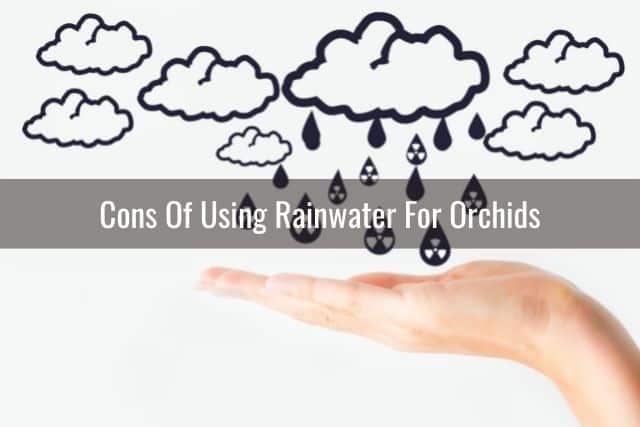
While there are many benefits to using rainwater on your orchids, there are a couple of drawbacks to consider.
Pollutants In The Rainwater
Depending on where you live, the rainwater quality may actually be worse than your tap water. It is rare, but it does happen.
This would be the case if you live in an area with high pollution or frequent wildfires. Areas with high levels of pollution from industrial plants and burning of fossil fuels tend to be at higher risk for acid rain occurring.
As rain falls, it will inevitably collect the dust, debris and pollutants in the air. Acid rain contains many pollutants. While it may look and feel like regular rainwater, it is actually harmful to our plants and ecosystem.
In addition, as that collected rainwater gradually evaporates over time, the pollutants and chemicals in the rainwater become more concentrated.
Remember, orchids are delicate plants and prefer very light feeding when fertilized. Imagine how they would react if they were given polluted rainwater with concentrated pollutants. This type of contaminated water would likely cause damage to the delicate velamen on the orchid roots, leading to stunted, slower growth.
Not Available Year-Round
Unless you live in an area with frequent rainfall year-round, there will be some months out of the year where you will not have rainwater readily available.
One way to get around this is to collect and store the rainwater for use in the future. I will talk about how to do this in more detail below.
Another consideration is, if you live in a condo, apartment, or a shared housing situation, collecting and storing rainwater long-term may not be feasible for you. In that case, you may have to use opt to use rainwater for your orchids as it is available. This would be either during or shortly after a storm.
May Not Be Allowed In Your Area
Before you get started, be sure to check local regulations and laws related to the collection of rainwater. In some areas, it is illegal to collect and store rainwater.
Likewise, if you live in a town home or condo with an HOA (Homeowner’s Association), it may be against the HOA’s rules to have a rain barrel or other type of water collection container outside on the balcony or patio.
So, in addition to checking local county and state laws, you will want to make sure collecting rainwater will be allowed by the HOA (if applicable) before you start.
Is Rainwater Clean?
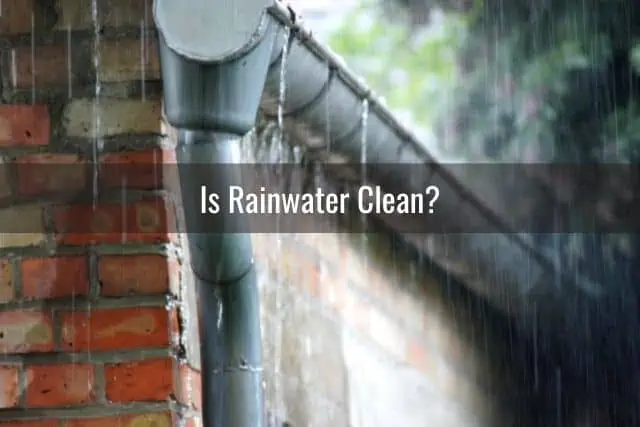
Yes, in most cases, fresh rainwater is clean! The only exception would be contaminated rain found in heavily polluted areas or regions with active fires and smoke. Overall, fresh rainwater is a wonderful option for plants, including orchids.
In fact, many orchid growers collect rainwater and use it to water their orchids. Rainwater is typically free of sediments, hard minerals, chemicals and other things that you may find in tap water or well water.
If you are noticing a lot of deposits on your orchid leaves or in the potting media as a result of the tap water, you may want to switch to using rainwater for a while to flush out the pots.
On that same note, if your Paphiopedillum orchid’s growth is lagging, try watering it with just rainwater for a couple months. It should help.
Collecting Rainwater For Orchids
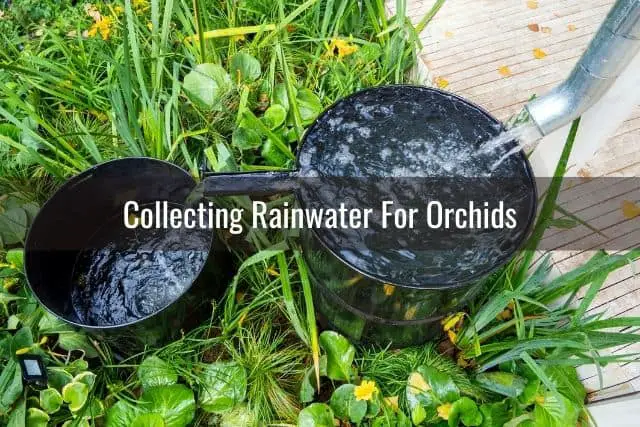
When collecting rainwater for your orchids, you’ll need to ensure that the collection container is clean. If possible, wash the container with soap and water before use. This will help remove any residue, pathogens or mold spores, and dirt from inside the container.
Next, use a fine-mesh screen to cover the opening of your water collection container. Whether you are using a bucket, a water butt, rain barrel or a water tank, this mesh screen will help filter out debris from your rainwater collection. Debris can include anything from leaves, twigs, dead insects and other items that may get pushed down from the roof and into the gutter.
Last, you’ll want to set your collection container outside, ideally near a downspout. Doing so will allow you to divert much of the rainwater from the roof down into your container. Now, what kind of container should you use? Let’s talk about that next.
Rain Barrels And Other Collection Methods
In terms of actually collecting the water, there are a variety of options to choose from. If you only have a small patio or balcony area, you may just opt to use a 5-gallon bucket to collect water during each storm.
Those with a larger patio or backyard can set up a rain barrel like this one outdoors. I have a rain barrel similar to this one in my backyard.
Since my rain barrel is set a little ways away from the wall, I simply use this rainwater diverter to help guide the water into the rain barrel. I like this diverter because it has an open/close flap that lets me close the downspout when it is not in use or the rain barrel is full.
You can also use a rainwater diverter like this one which more directly connects to the rain barrel and funnels the water straight into the collection container.
If cost is a concern, you can simply buy a heavy-duty plastic garbage can and a round mesh-screen cover. Set it up by cleaning it and placing the round mesh-screen cover over the top.
During the rainy season, you can position it under the roof’s downspout or even just outside on a flat surface. When it rains, it will catch gallons of fresh rainwater for you.
If you are feeling particularly handy, you can install a simple rain barrel spigot towards the bottom of the barrel or garbage can. This would allow you to connect a hose to the water collection container and more easily water your orchids and other plants later on.
How To Store Rainwater And Keep It Clean
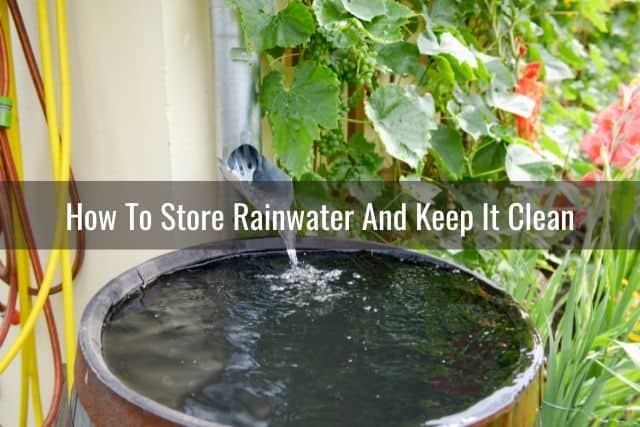
When watering orchids with rainwater, you’ll need to be mindful that sediments, bacteria or fungi may be present in the rainwater. That water will sit until you plan to use it.
During that time, bacteria, fungi and insects, such as mosquito larvae, may multiply. Stagnant water is a breeding ground for all sorts of things.
Keeping Rainwater Clean For Your Orchids
To counteract this risk, you can either use your rainwater in a timely manner or add a little chlorine to the rain barrel if you are planning to store the water long term.
Once you are ready to use the water, draw some water out of the rain barrel and let it stand for several hours. The chlorine will evaporate from the rainwater and will not affect your orchids.
Rest assured that unless the water is obviously dirty or your orchids are already stressed or sick, most of the time, your orchid will be fine. Remember, pathogens also need a point of entry in order to harm the orchid.
Preventing Rainwater From Getting Dirty In The First Place
Keep your downspouts and gutters clean! This is one of the biggest things you could do in keeping the water clean. Rainwater flowing down a dirty, leaf-filled gutter will also end up dirty and full of sediment.
Before the rainy season starts, take the time to thoroughly clean your gutters, or better yet, clean them out and then install gutter guards such as these. Gutter guards help prevent leaves, twigs and other debris from falling into your gutters, meaning less work for you in the future.
Before you start collecting the rainwater, you can also just let the first major storm of the season wash off the debris and sediment that has accumulated on your roof during the year. After this first storm has passed, you can then set up your rainwater collection container.
In addition, make sure you have a mesh cover over your rain barrel’s opening. This will help keep leaves and other debris out of the water. When you are ready to use your water, you may want to use a filter to remove the sediment from the water.
If you are storing your rainwater outdoors, be sure to keep it out of direct sunlight. This will help prevent algae from growing. Better yet, invest in an opaque, light-proof container.
If stored properly, clean rainwater can last for many months. It can be safely used to water your plants, including orchids.
However, if you notice that your collected rainwater looks cloudy, discolored, or has a foul odor, do not use it. These are all signs of contaminated water and should be thrown away.
Most likely, the water has a high level of bacteria or some other pathogen. Watering your orchids with this would be incredibly damaging to your plants.
Is It Ok To Water Orchids With Sediment In The Rainwater?
Oftentimes, when you collect rainwater that is “runoff” water from the roof or gutters, you may find some or a lot of sediment and debris in the water. This debris can include leaves, twigs, and small pebbles. The sediment is largely dirt and other material picked up from the gutters and roof.
While it is likely not going to be harmful to your orchids, it is better to try to remove this sediment and debris from the water before using it.
You can filter out the debris by using a reusable coffee filter. Place this filter inside of a larger funnel and pour your rainwater over this filter and into another container. You can also place a paper towel inside the filter for even more filtration. Alternatively, you can also use a fine-mesh strainer to do the job.
Small sediment or particles that pass through the filter are fine. It is the larger pieces of debris that you are trying to remove from the rainwater.
What Is The Best Way To Water Orchids?
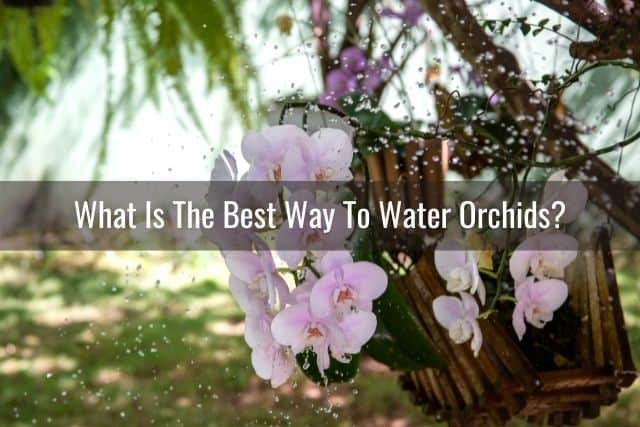
Once you’ve decided what type of water to use, you’ll also need to consider technique, timing, and frequency when watering your orchids.
How To Water Orchids
There are a number of ways to water orchids, including watering from the top, from the bottom, using the soaking method, or simply letting the water run through. Watering from the top is most ideal, accompanied by either soaking the orchid pots in water or letting the water run through.
I would recommend sticking to the technique that works best for you and your orchids. I personally like to water my orchids with the soaking method, which I describe in more detail in my guide on how to water orchids.
Other orchid growers prefer to water from the top and allow the water to run through, which works too. If you do this, just make sure you water your orchids thoroughly. Water your orchid so that the velamen is saturated and the orchid roots become green.
No matter how you decide to water your orchids, just water the roots and potting media only. Avoid letting water settle in the crown and on the leaves. This is particularly true if you are using rainwater that has been sitting out for a while, as it likely contains some level of fungi or bacteria.
Allowing this water to sit in the crown or the leaves can lead to crown rot, stem rot, or brown spot. If water gets into the spaces between the main stem and the leaves or in the crown, use a paper towel to soak up this water.
When To Water
Another tip is to water your orchids early in the morning. This will allow time for excess water to drain away. In addition, it gives the potting media a chance to dry out before nightfall. By doing so, you will be able to help prevent root rot.
Also, make sure you have good air flow around and between your orchid pots. Adequate air movement will help excess water evaporate and prevent fungal infections from taking hold.
How Often To Water Your Orchids
The general rule of thumb is to water your orchid when the potting media is nearly dry. Use a chopstick or your finger to check how damp or dry the top 2-inches of potting media are, then water accordingly.
Bark-based orchids tend to need watering at least once a week, or twice a week in warmer weather.
If your orchid is potted in moss, then it can generally go 10-14 days between waterings.
Still, keep an eye on the moss. You want to water the orchid before the moss dries out, since the moss will wick moisture away from the roots. This can result in dried, shriveled orchid roots and an orchid with wilted leaves. You can read more about how to water an orchid potted in moss here.
Final Thoughts
Rainwater is free and an excellent way to water your orchids. It is largely free of impurities, minerals and harmful chemicals.
However, because rainwater does not contain additives, you will need to add orchid fertilizer to the water before using it on your orchids. This will provide your orchids with the nutrients it needs to grow.
If you are able to collect rainwater during the rainy season, do so and give it a try on your orchids.
